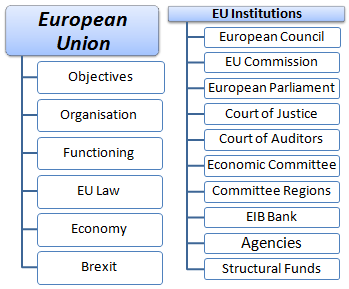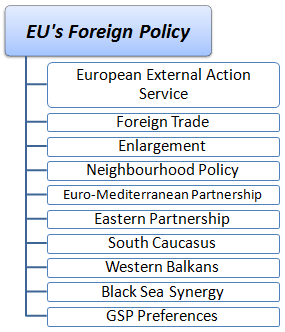Master in International Economic Relations
Master in International Economic Relations and Regional Integration
The Master in International Business (MIB) specialization in International Economic Relations and Regional Integration taught by EENI Global Business School offers to students a global and practical vision on all the issues related to the international economic relations between countries and / or regional trade blocs, as well as the regional economic integration process in the world.
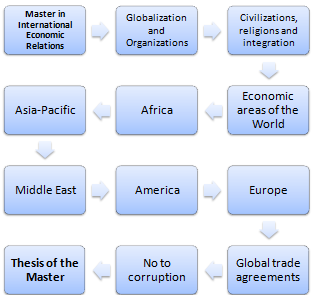
The student analyses the trend towards regionalization, analysing the eight current civilizations, the role of Religions in these civilizations and their relationships with the processes of economic integration in the world. Thus, it is possible to define and characterize the eighteen world economic areas and their economic interactions.
Institutions, economic areas and Trade Agreements analyzed on the Master:
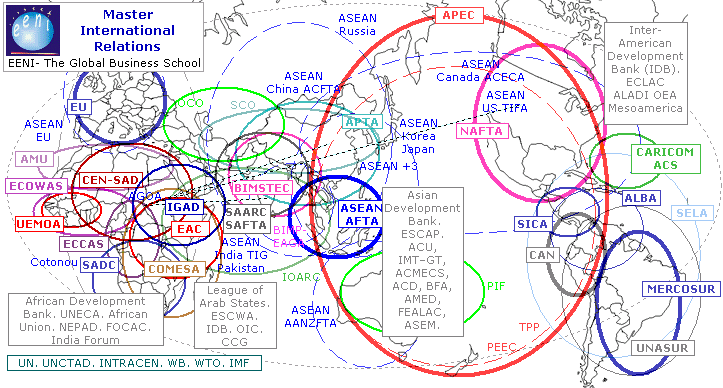
 Enrol / Request for Information
Enrol / Request for Information

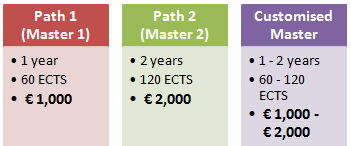
Paths of the Master
The Master in International Economic Relations allows the student to select three paths of different duration, content, tuition fees, and diploma issued in order to fit the Master to the student needs and schedule.
- Credits, Fees and Duration: (17 € /
 )
)
- Master 1: 60 ECTS (1-year It is recommended to dedicate about twelve hours of study per week following a flexible schedule. It is possible to reduce the duration dedicating more hours a week) / € 1,000 Euros
- Master 2: 120 ECTS (2 years) / € 2,000 Euros
- Customized Master
- Financing
- Master 1: 60 ECTS (
- Open Online Enrollment
- Download the Admission Form
- Frequently Asked Questions (FAQ)
Language of the Master: 
- Also
A Professional Master intended for all those wanting to specialize in the International Economic Relations and regional economic integration process.
The Master in International Economic Relations is especially designed for all those who work, or wish to work, in the institutions related to international economics or Internationalization: multilateral and regional organizations, development banks, investment agencies, Ministries of foreign trade, Chambers of Commerce, Business Associations, National Customs, Consultants, Internationalization departments of large companies...
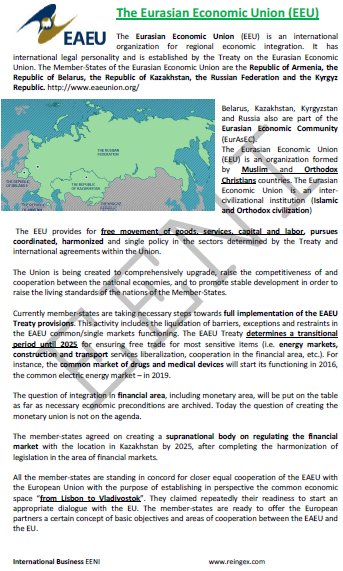
- Globalization and International Organizations (WTO, World Bank, IMF) (6 ECTS)
- Civilizations, Religions, and Economic Integration (2 ECTS)
- World Economic Areas
- Africa
- Economic Areas of the African Civilization: West Africa, Central Africa, Southern Africa, East Africa and the Maghreb (7 ECTS)
- African Economic Institutions (African Union, ECA, NEPAD...) (5 ECTS)
- African Integration Processes (COMESA, SADC, EAC, UEMOA, CEMAC, Tripartite Agreement...) (5 ECTS)
- Economic integration in the Maghreb (1 ECTS)
- Economic integration in West Africa (4 ECTS)
- Economic integration in Central, Eastern and Southern Africa (6 ECTS)
- Economic integration in Africa (2 ECTS)
- The State of the African Integration (8 ECTS)
Free Trade Agreements related to the African Countries
- International economic relations of Africa with the other economic areas (10 ECTS)
- Asia-Pacific
- Asian Economic Areas (7 ECTS)
- Hindu Economic Area
- Sinic Economic Area
- Buddhist Economic Area
- Islamic Economic Area:
- Central Eurasian Economic Area
- Malay Economic Area
- Western Civilization: Oceania Economic Area
- Asian Economic Institutions. Asian Integration Processes (ASEAN, SCO, SAARC, ECO...) (6
ECTS)
- Asian Trade Agreements
- International Economic Relations with the other economic areas
- Asian Economic Areas (7 ECTS)
- Middle East (6 ECTS)
- Arab Economic Area of the Islamic Civilization
- Economic institutions (OIC, Arab League...) and economic integration (Gulf Cooperation Council) of the Arab Countries
- Arab Development Funds
- Trade Agreements related to the Arab Countries
- International Economic Relations with the other economic areas
- America
- American Economic Areas of the Western Civilization: North-American, Latin-American and the Caribbean (6 ECTS)
- American Economic Institutions. American integration processes (MERCOSUR, Andean Community, USMCA/NAFTA 2.0) (12
ECTS)
- Trade Agreements related to the American Countries
- International Economic Relations with the other economic areas
- Europe
- European Economic Areas;
- European Economic Area of the Western Civilization (2 ECTS)
- Orthodox Economic Area (2 ECTS)
- European economic institutions (2 ECTS)
- European integration processes (EU, EFTA...)
- European Union (7 ECTS)
- International relations of the EU (8 ECTS)
- European Free Trade Association (AELE) (2 ECTS)
- Central European Free Trade Agreement (ACELC / CEFTA) (2 ECTS)
- Other European Economic Organizations (2 ECTS)
- Trade Agreements related to the European Countries
- International Economic Relations with the other economic areas
- European Economic Areas;
- Global Trade Agreements and Cooperation Forums
- No to Corruption in International Business (4 ECTS)
- Thesis of the Master in International Economic Relations (10 ECTS)
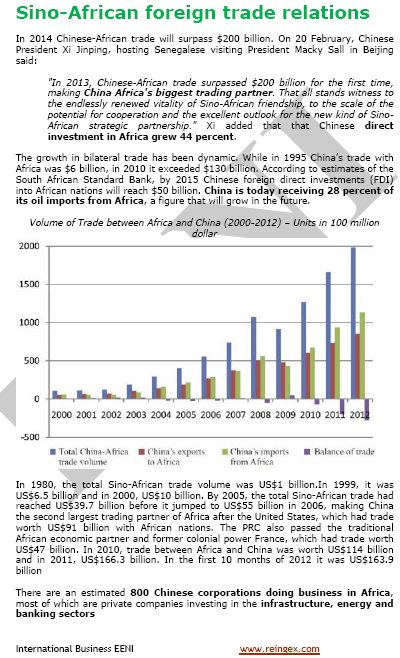
The objectives of the Master in International Economic Relations and Regional Integration are:
- To know the impact of the Globalization on the world economy and the role of the largest international Economic Organizations (World Bank, World Trade Organization, International Monetary Fund...)
- To analyze the trends towards regionalization, by analysing the current eight civilizations, the role of the Religions in these civilizations and the relations with the economic integration process in the World
- To define and characterise the eighteen economic areas in the World and the economic interactions between them
- To analyze the integration processes, main economic institutions and trade agreements in Africa, Europe, America, Asia-Pacific and the Middle East
- To learn about global trade agreements: APEC, Indian-Ocean Rim Association (IORA) or the Transpacific Strategic Economic Partnership Agreement (CPTPP)
- To study the impact of the largest Free Trade Agreements in the world
- To raise awareness of the need to prevent the corruption in international economic relations
Modules and Subjects of the Master

Module- Globalization and International Institutions
The student begins the Master in International Economic Relations studying the impact of the Globalization on the world Economy, the trends toward the economic regionalization, and the role of the largest international economic institutions:
- UN
- WTO
- WCO
- WB
- International Monetary Fund
- International Chamber of Commerce
- Organization for Economic Cooperation and Development

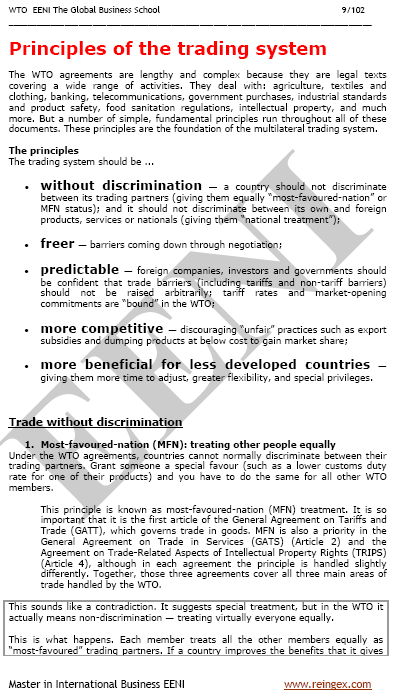
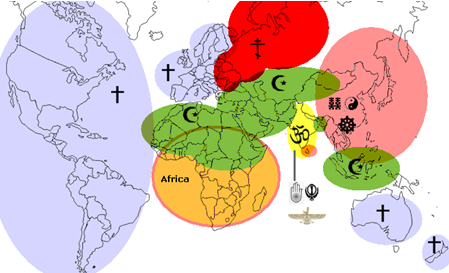
Module - Introduction to the Civilizations, Religions, and Regional Economic Integration.
The aim of module two is to know the status of the World: trade blocs, emergence of the African continent, emerging countries (BRICS), trends in regional economic integration... EENI has developed a unique methodology based on the concept of “Civilizations, religions, and regional economic integration.” Despite the phenomenon of the Globalization, businesses also tend to regionalization.
Analysing the role of the religions and civilizations in a globalized world; we can identify eight large economic spaces, composed of one or more economic areas.
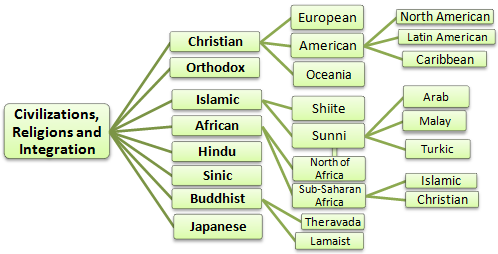
Civilizations in a globalized world
The eight major civilizations, their economic areas and their integration processes.
African Civilization
Hindu Civilization

Buddhist Civilization

Orthodox Civilization
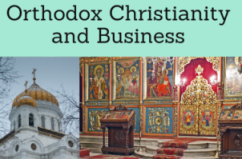
Japanese Civilization
Intra-civilizations integration processes
Economic interrelations between the civilizations.
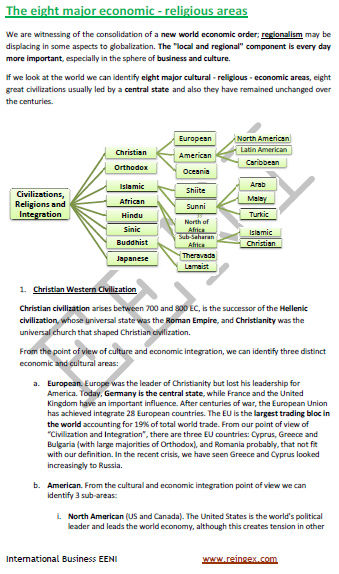
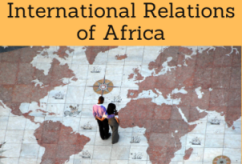
Module - Africa
Economic Area of the African Civilization.
- Leadership of Africa in the history of humanity
- African major religions: Christianity, Islam, and the African Traditional Religions
- African Central States: Nigeria (African largest economy) and/or South Africa (a BRICS country)
- Africa: the Next Emerging Continent
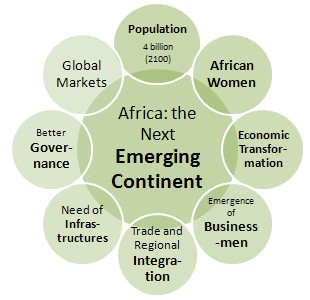
The five African Economic Areas:
- West African Economic Area (PDF)
- Central African Economic Area (PDF)
- Southern African Economic Area (PDF)
- East African Economic Area (PDF)
- Maghrebian Economic Area (PDF)
- Interactions with the other Civilizations

Institutions are Leading the African Socio-Economic Transformation.
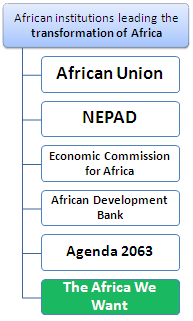
- African Union
- Economic Commission for Africa
- African Development Bank (AfDB)
- Agenda 2063 “The Africa We Want”
Download the syllabus “African institutions” (PDF).

African Economic Organizations.
- Arab Maghreb Union (AMU)
- Community of Sahel-Saharan States (CEN-SAD)
- West African Economic and Monetary Union (WAEMU)
- Economic Community of West African States (ECOWAS)
- West African Monetary Zone (WAMZ)
- Organization for the Development of the Senegal River
- Mano River Union
- Central African Economic and Monetary Community (CEMAC)
- Economic Community of Central African States (ECCAS)
- Southern African Development Community (SADC)
- Southern African Customs Union (SACU)
- East African Community (EAC)
- Intergovernmental Authority on Development (IGAD)
- Common Market for Eastern and Southern Africa (COMESA)
- COMESA-EAC-SADC Tripartite Agreement
- African Continental Free-Trade Area
- Niger Basin Authority
- Economic Community of the Great Lakes Region (CEPGL)
- International Conference on the Great Lakes Region
- OHADA
- Nile Basin Initiative
- Indian Ocean Commission (IOC)
- Bank of Central African States (BEAC)

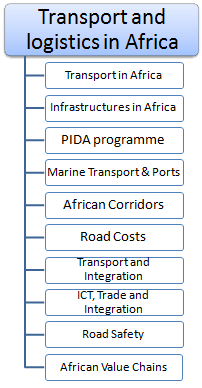
- Infrastructures in Africa
- Maritime Transport in Africa
- African Transport Corridors
- Rail Transport in Africa
- ICT, Regional Trade, and integration in Africa
- African Value Chains
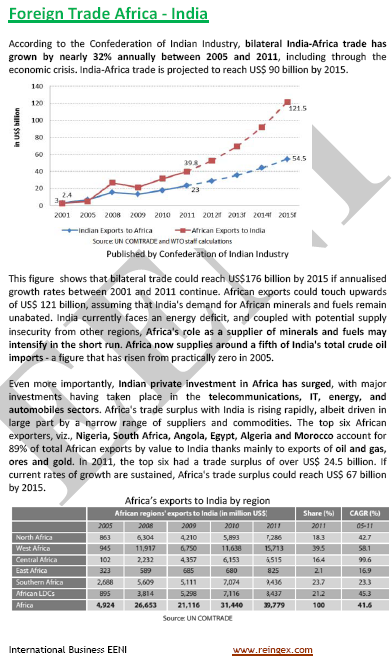
International Relations of Africa.
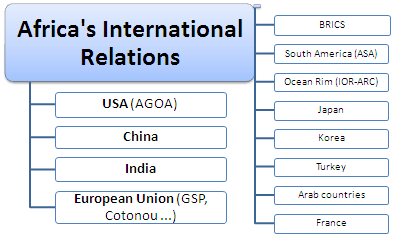
- AGOA - United States
- China-Africa Cooperation
- Africa-India Cooperation
- Afro-Arab cooperation
- Africa-Turkey Partnership
- Africa-BRICS Cooperation
- Africa-Asia Strategic Partnership
- Africa-Korea Partnership
- Asia-Africa Corridor
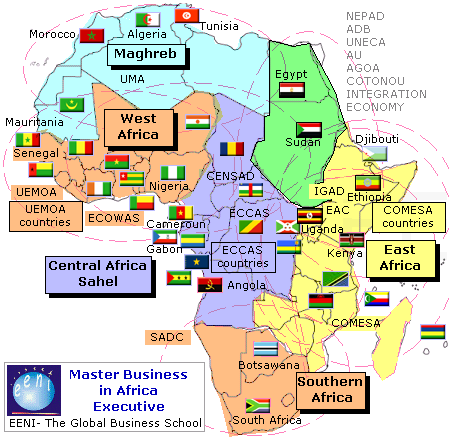
Download the syllabus “International Relations of Africa” (PDF).
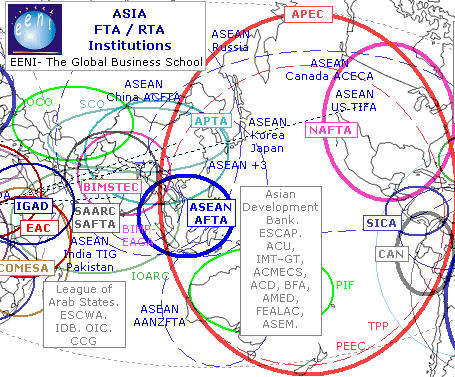
Asian Civilizations and Economic Areas.
- Hindu Economic Area (Hinduism) (PDF). India (a BRICS country) is the central state
- Sinic Civilization. China (a BRICS country) is the Central State. Religions: Buddhism, Taoism, and Confucianism
- Buddhist Economic Area (PDF)
- Central Eurasian Economic Area (Pakistan, Turkey, and Iran competing for the Central State) and the Malay Economic Area (formed by the three ASEAN Muslim Countries) of the Islamic Civilization (PDF)
- Japanese civilization
- Economic Area of Oceania of the Western Civilization (PDF)
Asian Economic Organizations and Integration.
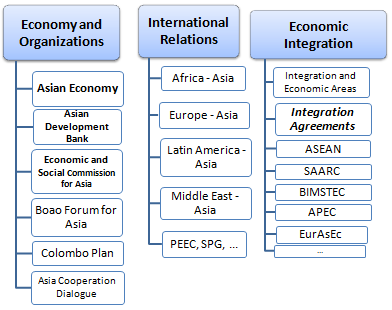
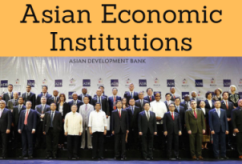
- Asian Development Bank
- Colombo Plan
- Africa-Asia Strategic Partnership
- Boao Forum for Asia
- Asia Cooperation Dialogue
- ESCAP
- Asia-Middle East Dialogue
- Forum for East Asia-Latin America Cooperation (FEALAC)
Asian Trade Agreements.
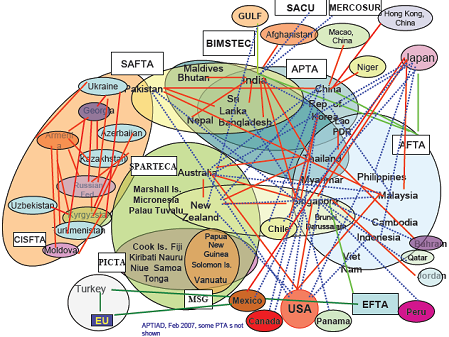
- ASEAN
- Indonesia-Malaysia-Thailand Growth Triangle
- ACMECS
- Brunei Indonesia Malaysia the Philippines East ASEAN Growth Area (BIMP-EAGA)
- SAARC
- Shanghai Cooperation Organization (SCO)
- Bay of Bengal Initiative (BIMSTEC)
- Asian Clearing Union
- Eurasian Economic Union (EAEU)
- Economic Cooperation Organization (ECO)
- South Asia Economic Cooperation (SASEC)
- Asia-Pacific Trade Agreement (APTA)
- Pacific Islands Forum (PIF)
- Oceania Customs Organization (OCO)
- Mekong River Commission (MRC)
- Greater Mekong Subregion
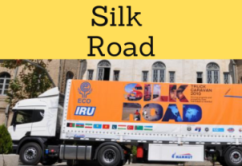
- Almaty-Bishkek Corridor
- Bangladesh-Myanmar Corridor
- China-Russia Corridor
- China-Pakistan Corridor
- China-Central-West Asia Corridor
- India-Afghanistan Corridor
- Europe-Caucasus-Asia Corridor
- Corridor of the Ashgabat Agreement
- Trans-Siberian Railway (Russia, North Korea)
- North-South Corridor (India-Russia)
- Afghanistan-Turkey Corridor
- Trans-Caspian Corridor
- East-West Corridor (Myanmar-Vietnam)
- Kyrgyzstan-Iran Corridor
- Islamabad-Istanbul Corridor
- Nanning-Singapore Corridor
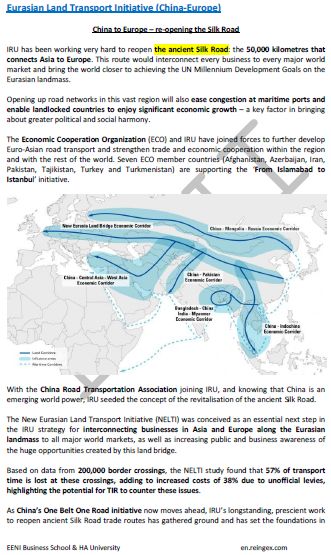

Module - The Middle East.
Arab Economic Area (Saudi Arabia is the Central State) (PDF) of the Islamic Civilization.
- Arab League (LAS)
- ESCWA
- Islamic Development Bank (IsDB)
- Organization of Islamic Cooperation
- Trade Preferential System (TPS-OIC)
- Cooperation Council for the Arab States of the Gulf (GCC)
- Arab Development Funds
- GAFTA
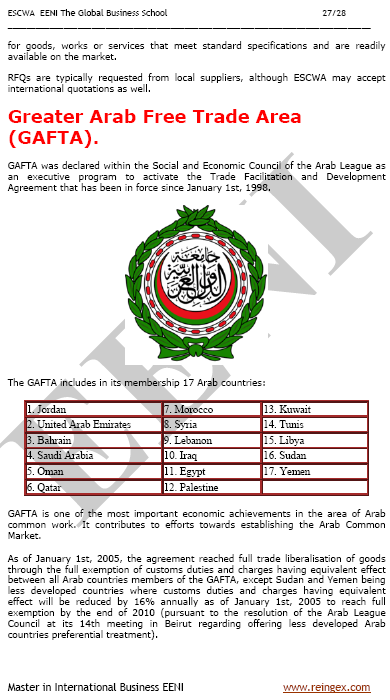
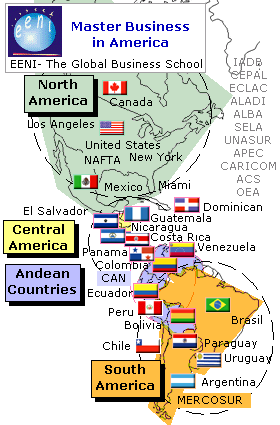
Module - America
American Economic Area of the Western Civilization:
- North American Economic Area with the U.S. as the Central State (PDF)
- Latin American Economic Area: Brazil (a BRICS country) is the Central State (PDF)
- Caribbean Economic Area (PDF)
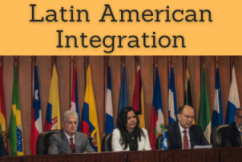
American Economic Organizations and Integration.
- OAS
- EECLAC
- Inter-American Development Bank (IADB)
- Latin American Integration Association (ALADI)
- UNASUR
- Latin American and Caribbean Economic System
- ALBA
- Mesoamerica Project
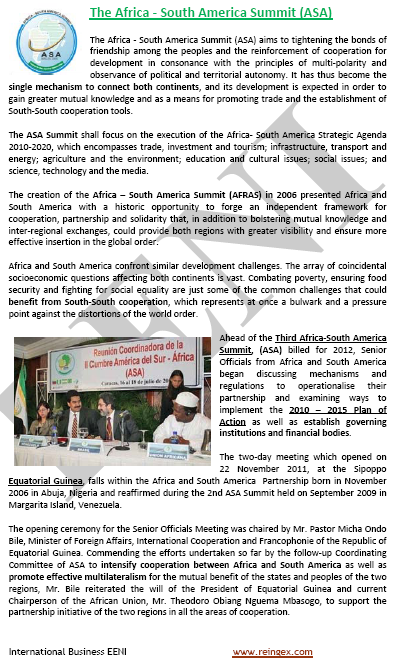
Trade agreements in Latin America.
- US-Mexico-Canada Agreement (USMCA/NAFTA 2.0)
- Central American Integration System
- Central American Common Market (MCCA) - Integrated with the SICA -
- Andean Community
- MERCOSUR
- Association of Caribbean States
- CARICOM
- Organization of Eastern Caribbean States
- Pacific Alliance
- Caribbean Basin Initiative
- Trade Agreements in America
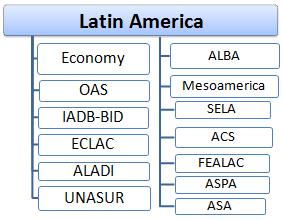

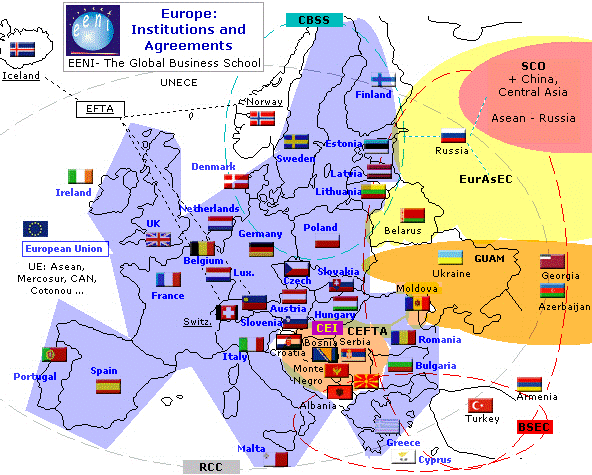
Module - Europe
- European Economic Area (PDF) of the Western Civilization
- Orthodox Economic Area (PDF)
- United Nations UNECE
- Central European Initiative
- Council of the Baltic Sea States (CBSS)
- Commonwealth of Independent States (CIS)
- BSEC
- GUAM
- Regional Cooperation Council (RCC)
- Organization for Security and Cooperation in Europe (OSCE)
- Adriatic-Ionian Initiative
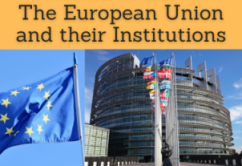
- European Union
- EIB
- European Economic and Social Committee
- European Neighborhood Policy
- Foreign trade of the EU
- EU Agreements
- EU's GSP
- EU Enlargement
- Euro-Mediterranean Partnership
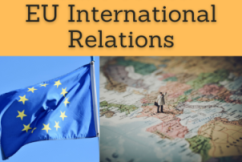
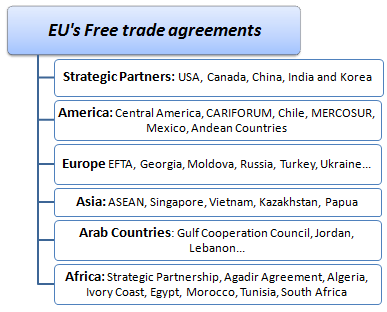
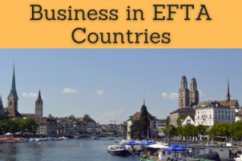
EFTA.
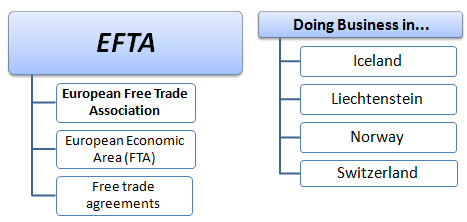
- America: Canada, Colombia, Chile, Mexico, Peru, Central America
- Asia: Singapore, India, South Korea, the Philippines
- Middle East: Gulf Cooperation Council, Jordan, Lebanon
- Africa: Egypt, Morocco, Tunisia, SACU
- Europe: Albania, Bosnia and Herzegovina, Georgia, Macedonia, Montenegro, Serbia, Turkey, Ukraine
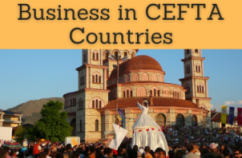
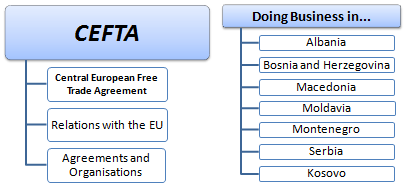
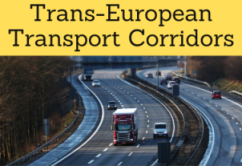
- Atlantic Corridor
- Baltic-Adriatic Corridor
- North Sea-Baltic Corridor
- North Sea-Mediterranean Corridor
- Mediterranean Transport Corridor
- Eastern Europe-Eastern Mediterranean Transport Corridor
- Scandinavian-Mediterranean Transport Corridor
- Rhine-Alpine Transport Corridor
- Rhine-Danube Transport Corridor
- Strasbourg-Danube Transport Corridor
- Pan-European Corridor II
- Pan-European Corridor IX
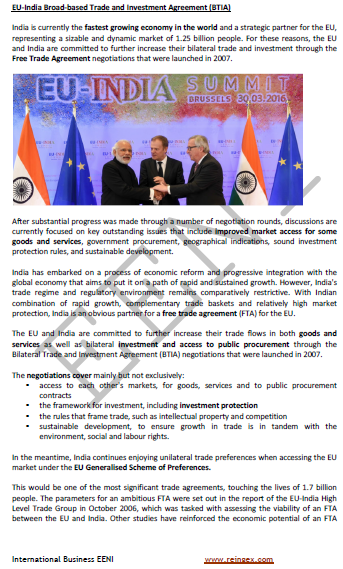
Module - Global Trade Agreements and Cooperation Forums.
Global Trade Agreements.
- Indian-Ocean Rim Association
- Agreement for Trans-Pacific Partnership
- APEC
- Global System of Trade Preferences
- Trade Negotiations Among Developing Countries
Economic Cooperation Forums.
- FEALAC
- Summit of South American-Arab Countries
- Africa-South America Summit
- Pacific Economic Cooperation Council (PEEC)
- Asia-Europe Meeting
- Asia-Middle East Dialogue (AMED)
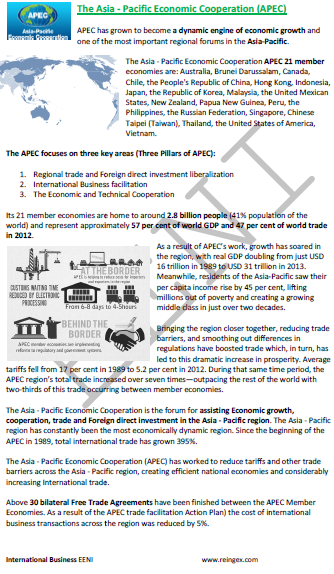

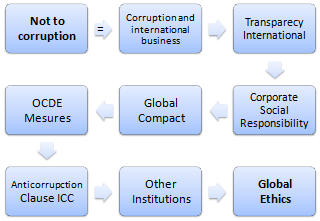

Professional Master's Diploma Obtained
The student has to pass the online continuous assessment exercises for each subject as well as the final online Master's Thesis. If the professor considers that the minimum level has not been reached, he will guide the student to improve the quality of his exercises or thesis and send them back.
The most important thing for EENI is that the student correctly learns the Master's subjects and objectives.
Once all the exercises and thesis have been approved, the student obtains the “Diploma of Professional Master of Science (MSc) in International Economic Relations and Regional Integration” issued by EENI Global Business School.
In this case, it will be necessary to send us by mail (not valid by email) a certified photocopy of your diploma of Bachelor's Degree. This is necessary for the issuance of your diploma and not to enroll.
Students who have passed this Master (120 ECTS) can validate the subjects in the EENI Doctorate. In this case, the total amount of the doctorate will be € 2,000.
Those students, who are not in possession of a Bachelor's Degree, may Enroll but will receive the “Advanced Certificate Program in International Economic Relations.”
Related masters:
Master in International Business University Ouaga II (Burkina Faso) and EENI
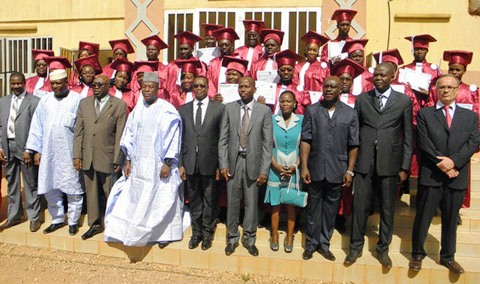
(c) EENI Global Business School (1995-2025)
Top of this page











 WhatsApp
WhatsApp





